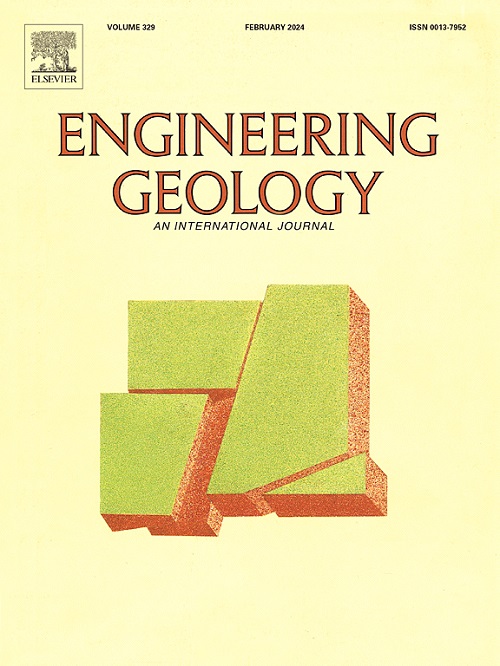菲律宾吕宋岛西北部 2022 年 7 月和 10 月地震的液化影响测绘与特征描述
IF 6.9
1区 工程技术
Q1 ENGINEERING, GEOLOGICAL
引用次数: 0
摘要
2022 年 7 月 25 日发生的 7.0 级地震和 2022 年 10 月 25 日发生的 6.4 级地震造成菲律宾吕宋岛西北部低地发生液化。随着液化现象的广泛发生,我们开发了一种方法来绘制地图并评估其影响,该方法结合了绘图技术、地貌分析、历史液化记录和经验公式审查、现有遥感技术的利用以及各种地球物理和岩土工程设备的应用。MW 7.0 地震的大部分液化影响发生在阿布拉河三角洲沿岸,而 MW 6.4 地震的大部分液化影响集中在索尔索纳盆地的河堤和废弃河道。粒度分析证实,沉积物确实有可能液化。通过折射微震波(ReMi)和螺旋驱动测深(SDS)试验获得的土壤参数也显示出很强的相关性,液化潜力值从低到高不等。土壤周期值也与 ReMi 和 SDS 结果一致:这项研究的结果强调:1)对受液化影响的地区进行详细测绘和评估,对于帮助研究人员和规划人员减轻危害非常有价值;2)采用地球物理和岩土工程方法进行特定地点液化潜势评估是合适的、侵入性较小的替代方法。本文章由计算机程序翻译,如有差异,请以英文原文为准。
Mapping and characterization of the liquefaction impacts of the July and October 2022 earthquakes in Northwestern Luzon, Philippines
The 25 July 2022 MW 7.0 and 25 October 2022 MW 6.4 earthquakes caused liquefaction in the lowlands of Northwestern Luzon, Philippines. With the widespread liquefaction occurrence, a methodology was developed for mapping and assessing its impacts, which combined mapping techniques, geomorphological analysis, review of historical liquefaction accounts and empirical equations, utilization of available remote sensing technologies, and application of various geophysical and geotechnical equipment. The majority of liquefaction impacts of the MW 7.0 earthquake occurred along the Abra River delta, while the MW 6.4 earthquake had most of its liquefaction impacts concentrated in river dikes and abandoned channels across the Solsona Basin. Grain size analysis confirmed that the sediments indeed had the potential to liquefy. The soil parameters obtained using the refraction microtremor (ReMi) and screw driving sounding (SDS) tests also showed strong correlations, with liquefaction potential values ranging from low to high. Soil period values were also consistent with the ReMi and SDS results.
The results of this study emphasize that: 1) detailed mapping and assessment of areas affected by liquefaction is valuable in aiding researchers and planners in hazard mitigation; and 2) the geophysical and geotechnical approaches employed are suitable and less invasive alternatives in site-specific liquefaction potential assessment.
求助全文
通过发布文献求助,成功后即可免费获取论文全文。
去求助
来源期刊

Engineering Geology
地学-地球科学综合
CiteScore
13.70
自引率
12.20%
发文量
327
审稿时长
5.6 months
期刊介绍:
Engineering Geology, an international interdisciplinary journal, serves as a bridge between earth sciences and engineering, focusing on geological and geotechnical engineering. It welcomes studies with relevance to engineering, environmental concerns, and safety, catering to engineering geologists with backgrounds in geology or civil/mining engineering. Topics include applied geomorphology, structural geology, geophysics, geochemistry, environmental geology, hydrogeology, land use planning, natural hazards, remote sensing, soil and rock mechanics, and applied geotechnical engineering. The journal provides a platform for research at the intersection of geology and engineering disciplines.
 求助内容:
求助内容: 应助结果提醒方式:
应助结果提醒方式:


